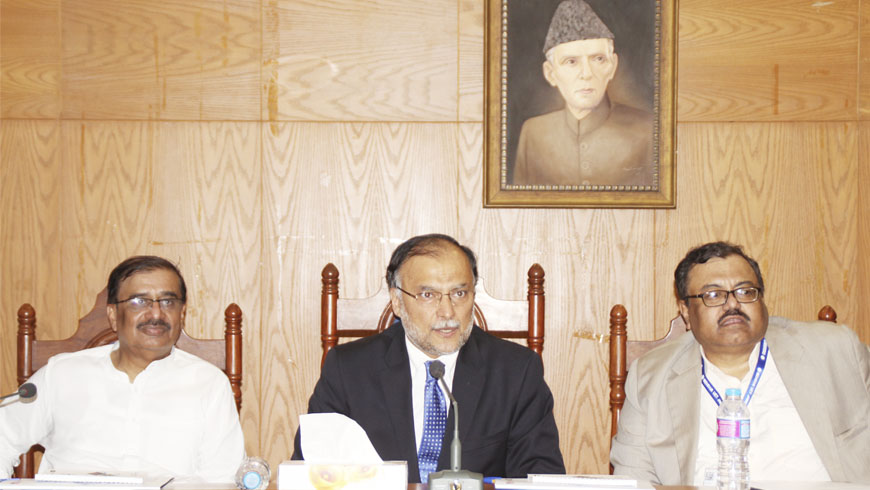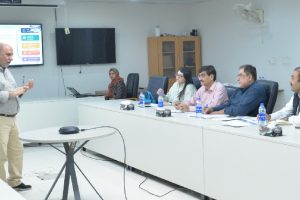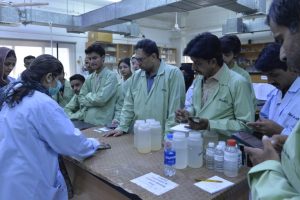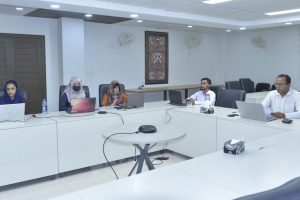
Federal Minister for Planning, Development and Reform Ahsan Iqbal visits USPCAS-W MUET Jamshoro
Ahsan Iqbal, Federal Minister for Planning, Development, and Reform on Tuesday said that Pakistan was the next emerging economy of Asia and soon it would become an Asian Tiger with fully developed infrastructure and economic development. He said this while interacting with the faculty and students of U.S-Pakistan Center for Advanced Studies in Water (USPCAS-W) at the Senate Hall of Mehran University of Engineering & Technology (MUET), Jamshoro.
“We are implementing plans to avert future water crisis for Pakistan. Work on Diamer Bhasha Dam has been expedited. The government has acquired land with $1billion to begin construction of the project, which will give 600,000 million acre feet water reservoir and 4,500 MW power. Many other hydro projects have been started. We must find solutions for water efficiency and clean drinking water to meet future needs”, said Ahsan Iqbal.
He said through applied research and technology, the solutions to the challenges faced by Pakistan could be sought. He said that Pakistan was one of the vulnerable countries facing the serious shortage of water and climate change but the solutions of these vulnerabilities were in the science, engineering, and technology.
He said that USPCAS-W was one of the Centers for Advanced Studies (CAS) Higher Education Project of the federal government funded by the United States Agency for International Development (USAID) Pakistan, which would provide economical and energy efficient solution to the government for the water and energy crisis. He said that human genius had cracked the DNA Code after continuous research efforts and similarly the researchers of this Center will seek the solutions of water, agriculture, and climate change related issues.
He said Pakistan, in past, had missed various opportunities of economic growth and development due to political destabilization, mistrust among the federating units, and lagged behind in the science and technology. But now, he said, the country was the next emerging economy in Asia by maintaining the most rapidly economic growth in the region.
Federal Minister Ahsan Iqbal, while referring to China-Pakistan Economic Corridor said that the CPEC was a fusion of multiple developments in the global, regional, bilateral and domestic contexts. The ultimate objective of the CPEC, he said, was peace, prosperity, and well-being of the people of the two countries, the region, and the world.
Ahsan Iqbal said in the recent past, Pakistan was considered one of the most dangerous countries in the world but during the last few years, things had improved and the country had been transformed into an emerging economic power in Asia. He said the country had to maintain six to eight percent Gross Domestic Production (GDP) growth rate as an emerging economy.
He said the present government had worked very hard by leveraging the resources, investing in human capital, infrastructure, and transformation of science and technology.
He said Pakistan through CPEC was going to add 10,000 MW electricity to the national grid by May 2018, bridging the entire gap in demand and supply of energy consumption.
He said that the development of infrastructure would open the new vistas of development in the country and in this connection; Hyderabad-Karachi motorway would convert the both cities into the twin cities while the construction work on the Hyderabad-Sukkur motorway, Sukkur-Multan motorway, and other routes would be started very soon.
He said the government was establishing campuses in each and every district of the country to produce efficient human resources. While answering the questions of the students related to the water accord of 1991 and renewable energy sources, Minister Ahsan Iqbal said that Pakistan had the history of mistrust among the federating units and therefore the solidarity among the units was very much necessary to take the decision in the national common interest. Everyone had to respect the 1991 accord as it was a unanimously agreed document while now the units politically disagreed to evolve the consensus on new water reservoirs on the other side, he remarked.
He said that the base load was a prerequisite for renewable energy sources, and through the CPEC the base load for the solar and wind energy sources was being developed.
He further said that respective research and development organizations such as SUPARCO and Survey of Pakistan were being directed for sharing basic big data with researchers so that they could be facilitated. Entrepreneurs were also being encouraged to invest in developing softwares and mobile applications (Apps) in the country, he added. On this occasion, the traditional gifts, the souvenirs, and USPCAS-W promotional material were presented to the federal minister and other guests.
Before the interactive session, the federal minister also visited the new building of USPCAS-W. Syed Shah Muhammad Shah, President Pakistan Muslim League (N) Sindh accompanied the minister, where Vice Chancellor Dr. Mohammad Aslam Uqaili briefed him about the academic and research performance of the university and Project Director USPCAS-W Prof Dr. Bakhshal Khan Lashari also briefed the minister about the new building of USPCAS-W, laboratories, and facilities provided to the students. Among others, Pro-Vice Chancellor MUET Prof Dr. Tauha Hussain Ali, Dean Faculty of Architecture and Civil Engineering Prof Dr. Khan Muhammad Brohi and Deputy Director (Academics and Research) USPCAS-W Prof Dr. Rasool Bux Mahar were also present on the occasion.




